
 Flash News
Flash News
The body of a 29-year-old man in Klos is found after 6 days
Arrested a few meters from SPAK, the Special Prosecution seeks 17 years in prison for the drug 'boss'
Giro D'Italia starts today, here are the road axes that will be blocked in Tirana from 13:00-18:00
Who is the new Pope?
Pope Leo XIV greets the faithful for the first time in St. Peter's Square
The myth of the "invincible" Rama was shattered by the "McGonigal dossier"

Alfred Lela
Prime Minister Rama has made countless statements or jokes, synthesizing himself and the Socialist Party he leads as 'invincible.' When he compares himself with his rival and the party, he leads with the Democratic Party in opposition; he always talks about the apocalypse that will come for them and how he will be the Noah who will come out after the next election on the shores of victory.
Mr. Rama made this bullying public to create the perception that he is politically invincible and has transversal support in the Albanian electorate. Playing the intense and controversial leader, he has rarely reduced himself and the SP to false humility by saying, 'we are not the best, but there is no one better than us.'
Among other communication techniques, his favorite has been the construction of the bogeyman of Sali Berisha and Ilir Meta. However, this has often been lost in the general consideration that it is a political and, therefore, typical war. By saying, "I am better compared to them," Rama meant that he is not necessarily more robust, and this 'morality' has come into play whenever there have been crises or scandals in governance. In times of peace, he has always chosen bullying.
Beyond any other line of action and political discourse, the "invincible leader" has been and remains the main one. By strong leader, he did not mean political muscles, i.e., physicality, numeracy, or material superiority, but especially non-material, i.e., the mind. Rama has among his favorites the symbolism of the game of chess, borrowing similes from several manuals of the 'art of war' from Sun Tzu and Machiavelli to the authors of modernity. In chess, Mr. Rama, at least according to Mr. Rama, is "several moves ahead of the opponent." That finicky leader who knows his opponent but also works to defeat him. This narrative of the "invincible leader" borrows from the popular folklore where the myth of Enver Hoxha is still potent among Albanians.
This leadership, with a narrative but without substance, often impressed the critics or political opponents of the Prime Minister. Hush or openly, his "superior" political performance was taken for granted and unrivaled.
It took America dropping an atomic Little Boy on Albania in the form of the "McGonigal file" so that it was understood that Edi Rama's power was a sham. Although the public and the political class have seen many cases, not of Rama's strength but of his weakness, things from the outside are always accepted as axioms. The file revealed that Edi Rama is a weak politician who is terrified by his opponent and therefore does his best to defeat him not on the field but off it, not by rules, but by tricks, not by competition, but by political majesty. He does this even against common sense (the common sense in the English of his friend McGonigal). He goes so far as to include an American law enforcement agency, a holy grail that took its name as much from the cinema as from the history of fieldwork in his political game. Paradoxically, -karma is a bitch, right?- a game that started as chess did not turn out to be more than ordinary backgammon from what, as a teenager or child, he saw over the shoulders of adults in Tirana in the '80s. The myth of the strong leader fell into the dark well of the "McGonigal file." If nothing else comes out of the thrashing that made the bucket, it will be the knowledge of the insecurity and fear that Edi Rama has towards the opponent. Nothing but panic compels a politician in a democracy to aim for the elimination of the opponent by pre-political methods.
The recruitment of Charles McGonigal was not the first sign of this cynical and undemocratic methodology of Edi Rama. The squads of strongmen he introduced into Parliament or appointed mayors, the partnership he gave to local criminals in the management of election campaigns, as was seen in the files of Durrës and Dibra, the change of the Electoral Code ignoring and deceiving the opposition, were the garnish of that was being prepared in the shadows: the destruction of the political opponent, who would be tattooed with two unbearable stigmas: pro-Russian and anti-American forces.
The fact that this could be concluded by the head of a party that has practiced pro-Sovietism and anti-Americanism for at least 45 years would have been an unparalleled cynicism of history. Ultimately, freedom's revenge against its enemies enters the scene and turns the dramatic character, the leader with the invincible wand, into a backgammon-playing man. On his head is a hat with three letters: FBI. He says to his playmates: Charlie gave it to me. Netflix made a documentary; have you seen it? Unlike the indictment, where I was mentioned 14 times, in the series, only 2.
Latest news


The body of a 29-year-old man in Klos is found after 6 days
2025-05-09 12:01:27
Berisha: After May 12, this opposition will become the majority in Albania
2025-05-09 11:52:37
Leo XIV celebrates his first Mass as Pope
2025-05-09 11:42:34

Spaho denounces: SP candidate in Pogradec gives 100 thousand lek for the vote
2025-05-09 11:27:26
Mustafaj: Proud of the worthy campaign of the DP
2025-05-09 11:22:20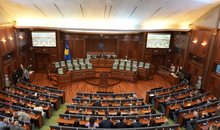
Constitution fails again, Kosovo still without a new Assembly
2025-05-09 11:06:55


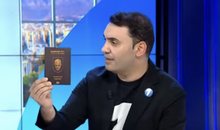


"Votes have no price", the US embassy in Tirana 'slaps' Rama
2025-05-09 10:06:49

Two young men arrested for supplying criminal groups with firearms
2025-05-09 09:45:19
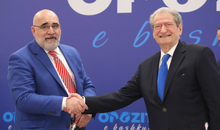




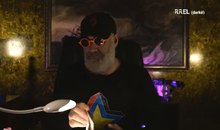

Foreign exchange/ How much foreign currencies are bought and sold today
2025-05-09 08:19:18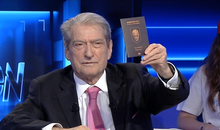
The gift that Berisha gave to Rama 'live'
2025-05-09 08:13:51
3 signs that show you are spiritually protected
2025-05-09 08:05:39

Bars can't hold back anymore, start increasing coffee prices, 4.7% more in April
2025-05-09 07:46:49
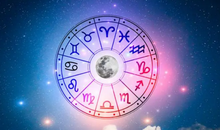
Horoscope, what do the stars have in store for you today?
2025-05-09 07:22:06
Unstable weather, afternoon brings rain
2025-05-09 07:01:29
Morning Post/ In 2 lines: What mattered yesterday in Albania
2025-05-09 06:45:46

How did LaCivita change the DP campaign? Berisha: He studied the opponent
2025-05-08 22:49:51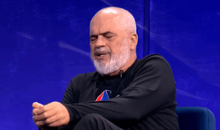

David defeats Goliath
2025-05-08 22:15:50

Journalist: There are SPAK infiltrators in party headquarters
2025-05-08 21:55:15
Who is the new Pope?
2025-05-08 21:48:13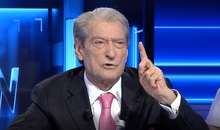
Berisha finally reveals when he will retire from politics
2025-05-08 21:33:46


LaCivita in Lezha: Albanians will fire Edi Rama from his job
2025-05-08 21:11:20


Berisha: LaCivita chose us because he believes in Reagan's program
2025-05-08 20:48:40
He rejected America to serve Pogradec, Genti Çela tells about life in "Elevate"
2025-05-08 20:26:28




Pope Leo XIV greets the faithful for the first time in St. Peter's Square
2025-05-08 19:29:33




Photo session with LaCivitta in Tirana: For Great Albania
2025-05-08 18:40:18
Source: DASH decision a personal victory for Berisha
2025-05-08 18:30:10
Take off those crazy glasses and see where you've taken him?
2025-05-08 18:02:47
LDK files criminal charges against members of the incumbent Government
2025-05-08 18:02:00







BIRN analysis: Tirana, the determining district for the future majority
2025-05-08 16:04:03




Chris LaCivita's contract with the DP, Berisha: 100% correct and clean
2025-05-08 15:11:11

"These are the peak days", Berisha reveals when he will travel to the USA
2025-05-08 14:45:25


Endless boxes with filled-in ballots, DP demands separation of votes from Greece
2025-05-08 14:11:12


Photo/ Who are the 3 associates of Talo Çela arrested in Dubai?
2025-05-08 13:37:09

Hetimi për krimet zgjedhore, Altin Dumani zbarkon në Prokurorinë e Shkodrës
2025-05-08 13:06:21
DASH paves the way for Berisha, Alizoti: Great news on the eve of Great Albania!
2025-05-08 13:03:48

"Freedom works", DP welcomes the US position
2025-05-08 12:48:07

Black smoke rises from the Sistine Chapel, the Vatican still without a Pope
2025-05-08 12:26:18
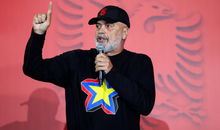




Davide Pecorrelli extradited to Albania
2025-05-08 11:29:04
'May 11, Albania will react', Xhaferri: Electoral criminals will pay
2025-05-08 11:21:46

Gjin Gjoni: Non Grata fell, Rama should get ready to go to McGonigal
2025-05-08 11:01:54
May 8th deadline for immigrants to vote in Greece extended by one day
2025-05-08 10:48:42
Collapse of massive chrome structure, still no trace of 29-year-old
2025-05-08 10:40:04
